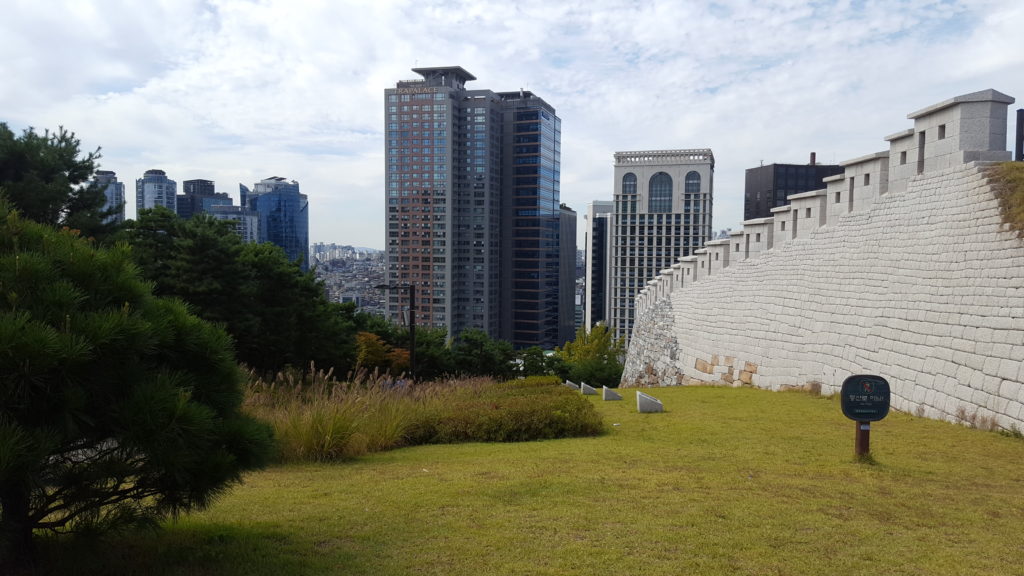
It’s been quiet around here! I’m back from taking a vacation for the first time in about a year, and it was a trip unlike any I had taken before. I traveled to South Korea, a place where I didn’t know the language and had only read about the country’s history in a few novels and in short U.S. history units on the Korean War. My interest in traveling to Korea emerged out of a combination of factors: an interest in seeing Asia Pacific, a desire to do a big city trip, and a love of gochujang and all manner of Korean spices and flavors.
I deliberately unplugged during the two weeks I was away: while I had intermittent access to e-mail and social networks, I made a deliberate choice to be as present as I possibly could in the experience of being abroad. I hadn’t travelled internationally (well, outside of North America…) in four years and, for me, travel is frankly one of the main reasons that I work. When I can immerse myself somewhere totally new, experience a new place, and live – at least as adjacently as I possibly can – in a completely different experience, I feel the borders of my experiences expand and change. While I cannot possibly claim that I get to know what it’s like to live someone else’s life, I do get to imagine my own self elsewhere, an experience that challenges me to re-consider what matters to me and what kinds of experiences are meaningful to me.
To that end, I couldn’t help but think about the experience of “learning” while I was away because traveling to a new city, while pleasurable, is also quite a lot of work. For months leading up to this trip, I took a lot of time to trip plan (with the help of my partner) to determine our itinerary, our lodging, and our sites of interest. Then, once we were there, we had the daily challenges of navigating through new places, determining our daily schedule, figuring out when and where to feed ourselves, and communicating with locals (neither of us had any Korean language skills, so we relied on the universal point, nod, and smile technique often enough). While on the road, we had to be learning quite a lot every day not only to meet our basic needs, but also to appreciate what we were seeing fully. We were, of course, both highly motivated to learn while on our trip, not just for our basic survival needs (which were, you know, pretty critical!) but also to be respectful of our surroundings and to deepen our knowledge of the ground we stood on, ground that we know had a legacy of conflict, colonialism, and strife (but also great joy, pride, and celebration).
The experience of learning while traveling, perhaps the most intensive form of experiential learning I can imagine, made me, naturally, think about my applications to work as an educator. One of the major criticisms I’ve heard of digital learning is the fact that digital learning does not feel as “real” or as integrated into embodied experiences as face-to-face experiential learning. There is some truth to the fact that no human interaction can feel quite the same as a face-to-face one indeed. In the same way, travel is so special precisely because seeing a major monument is a significantly more transformative experience than just looking at a picture online or watching a video about the place. Getting those face-to-face travel experiences – and to continue the comparison here, those face-to-face learning experiences – requires an immense amount of privilege, of course, and so what this trip made me consider was: how do we help our students maximize face-to-face experiences when they can have them and are there ways to bridge a digital intervention to bridge the in-the-moment experiences with the reflection that comes afterwards?
I mentioned earlier in this post that I deliberately unplugged while I was away. I didn’t blog. I didn’t Tweet. I didn’t post on Facebook. I sent a few scant e-mail messages and notes over Google Hangouts, but that was about it (and those were mostly to close family members and friends).
Yet I still wound up actively recording what I was doing and didn’t go anywhere without my phone. Digital experiences remained still closely tied to my travel, whether I was using Google Maps to navigate (which, incidentally, is not all that helpful in South Korea because South Korea has refused to sell any of its navigational data to Google), Google Translate to convert street signs to English, MangoPlate (a Korean food app) to find local restaurants, or even just my camera to take photos of what I saw. Yet I was thinking very deliberately about when my devices came out and when they didn’t. I didn’t even use my phone to journal: my partner and I shared a paper notebook that our wonderful friends Eric and Cindy made for us and we wrote notes about what we did every day (or close to every day; we had to play catch up on some evenings when we were too tired to write!).
So, what can we, as educators, learn about learning while traveling? Here are my major take-away notes:
- Record everything you can, then make decisions about what to curate later. We all need to be judicious about what we’re learning, making note of what matters to us and using our limited memory and energy to store those ideas in our brain. While in the moment of travel, it wasn’t always clear which experiences would be ones I’d want to record and which ones wouldn’t wind up being that meaningful later. So, I took pictures of lots of little things: anything that struck me in the moment deserved a photo. When my partner and I wrote down what we did that day, we recorded as many details as we could (including the moment when I accidentally locked myself in a bathroom because I could not read a sign with directions on how, uh, NOT to do that. Don’t worry, folks, I used my critical thinking skills to figure it out eventually!). But as we created a photo album for our family and friends later, we picked only our favorite pictures and are currently in the process of creating a pruned-down version of our trip journal to share stories with those who are interested. In other words, collection is a valuable skill while traveling, but curation is a critical skill upon return. Similarly, with our students, we may want to encourage them to archive and collect ideas when they’re in the classroom, but use the time outside of class to curate, reflect, and make critical choices about what they need to know.
- Don’t be afraid to ask for help. My partner and I were often lost while traveling. This is normal, and sometimes, getting lost can be really fun. Often, you discover new things when you wind up on a path you least expect! But we did need to ask for help when we were tired, hungry, or needed to find our proper places on the train. At times, I was afraid to ask for help, in large part because I wasn’t always sure we’d be understood. But my partner often fearlessly approached anyone he thought might have answers, almost always to positive effect (or the slightly embarrassed effect of “Sorry!” and the universal shrug symbol of “don’t understand”). My partner was a really great role model for approaching people without fear and it always paid off. In other words, asking for help is a good idea because it usually moves you forward in your thinking or exploration. There is no shame in support!
- Don’t try to do too much. I often experience “FOMO,” or “fear of missing out” when I travel. I recognize the limited time constraints of going on a trip and I don’t want to feel like I squandered that precious time away and in a place I may never visit again. So, I am the kind of person to put together an all-too-packed agenda and see what sticks. Of course, I’m willing to be flexible and make some adjustments on the fly, but I can sometimes feel dissatisfied if I don’t get to EVERYTHING I think is possible to do. But the truth is, trying to get through too many things is exhausting and unenjoyable. Finding the sweet spot of doing just enough while traveling is a huge challenge; similarly, finding the same sweet of learning just enough to advance an idea or make progress in one’s abilities is a challenge too. But working on limiting the scope of a goal to not do too much is an important learning principle for all of us. As a traveler, I have to set appropriate expectations for what can be accomplished. As an educator, I have to do the same thing, lest I suffer the risk of academic “FOMO.”
- Lean in to unexpected findings. Some of my favorite travel experiences are the ones I don’t plan, as much as I also love to have a pretty structured itinerary. When I’m a student in a class, I also feel some of the greatest joy when discovering a new text I had never read before or am introduced to an idea I may have never expected to encounter. While exposure to new things can be a bust – they might be boring or a waste of time – that risk is almost always worth the reward of potential joy through discovery.
I probably won’t take a big trip again any time soon, but I remain always grateful for the travel I get to do and the reminders that travel offers to me about what I appreciate and value in my life. I’m thankful I get to return to work where I can interrogate the value of new experiences everyday and help others structure introductions to those experiences too!
